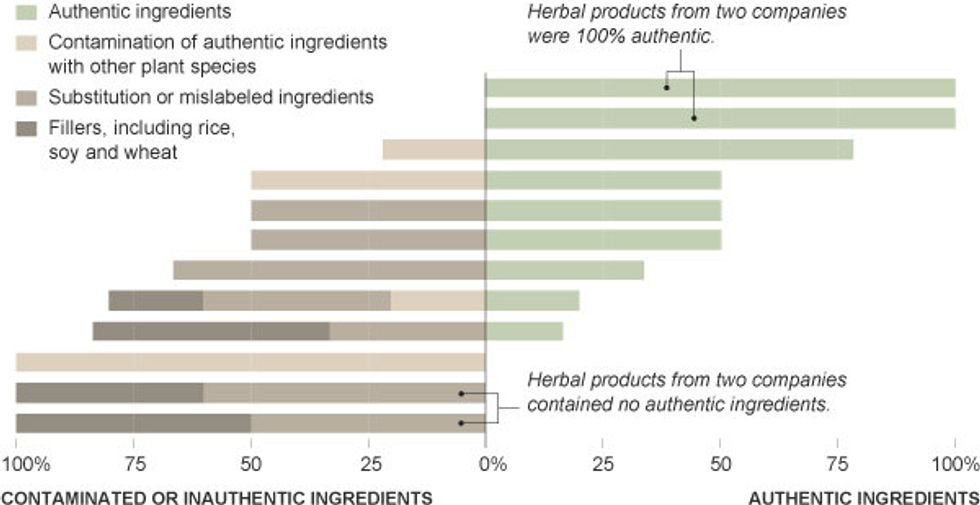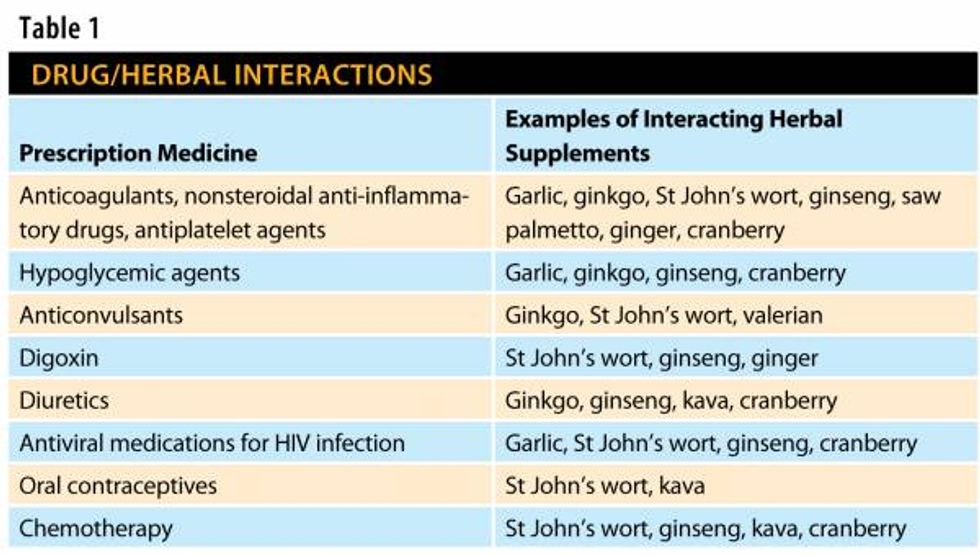Herbals and supplements are multi-billion dollar industry with good reason. Considering the increasing rates of chronic diseases, the poor American diet, and a quenching desire for a long fruitful life, herbals and supplements are considered a more natural method of obtaining any nutrients people are deficient in, or think they are deficient in, as well as being a modest attempt at helping cure disease states. As understandable as that desire may be, and there is much logic to it, herbals and supplements are not as reliable or safe as the public eye and the industry make them out to be. They are poorly regulated, commonly falsely labeled and advertised, usually not viable substitutes for actual medication, and sometimes have interactions with the necessary drugs patients need for treatment.
The Food and Drug Administration (FDA) is the government branch responsible for regulating the safety and advertising of most our foods, drinks, and drugs. The same cannot be said for herbals and supplements. While there is usually solid regulation for most items, and drugs need to undergo extensive clinical trials that can last several years before being approved, herbals and supplements have little to no requirements before they enter the market. The FDA’s actions towards the regulation of this class of dietary products are limited by the Dietary Supplement Health and Education Act of 1994. Under this legislation, it is illegal for manufacturers to provide a product that is inferior to what they claim it to be or is misbranded. Simply put, they cannot lie about what is on the label. Unfortunately, unlike drugs that need to be approved with evidence by the FDA, herbals and supplements require absolutely no testing. It is the sole responsibility of the manufacturer to ensure that their product is what they label it as. This is where the major issues begin to arise, when the responsibility of approving safety and efficacy is placed on the shoulders of those who want to profit from their product. It’s like letting the kid in the park selling drugs tell you it’s actually tasty candy. The only method the administration has of enforcing these products is to do surveillance after it hits the market and look out for any studies or reports that provide substantive evidence that the product is dangerous, contains something it shouldn’t, or provides an amount of an ingredient that is different from what the manufacturer claimed.
The net result is the surge in fake supplements that have nothing they claim to be in it. Absolutely anything could be in it without us having any idea what we’re consuming. Taking a chance on a supplement that isn’t backed with evidence and support from caring health care professionals could at best lead to a product that moderately works. More often than not, it won’t have an effect because it does not have anything it claims to have, or it may even have dangerous amounts of what it claims to have. People only need a certain amount of each nutrient each day, each nutrient varying in the amount necessary. However, obtaining too much of a nutrient such as Vitamin D can actually be severely toxic, causing increase in calcium levels and thus leading to the calcification of tissue and blood vessels that can lead to severe diseases states. Adding onto that, these products can contain ingredients not listed on the package which can be harmful or interact with other medications in a negative manner.
Another point to be weary of with herbals and supplements is that they are not substitutes for actual drugs and medications. The difference between the two lies in everything mentioned above. Drugs and medication have undergone trials for years to mark their safety and risks, and also undergo post-market surveillance. They are extensively regulated and scientific studies are constantly being performed to prove their efficacy and compare them to other medications in the market. Furthermore, drugs are developed with an understanding of how the body works on a molecular level. It’s mechanism of action to produce the desired effect is proven through not only the years of research and clinical trials the drug had to endure, but also through decades of prior research in the sciences of the human body. That’s not to say they are perfect, or that the FDA handles everything perfectly but there is a strong backbone of evidence behind them. On the other hand, some herbals and supplements do not have the same level of evidence that these medications have; some are commonly used based on beliefs, culture, a faint understanding of its effects on the body and its mechanism of doing so. When it comes to these products versus a recommended drug, it is safest to go with what's proven to deliver desired results.
One last caution to reiterate is the interaction between some supplement and herbals, and other drugs. For example, ginseng is a common natural product that has shown varying evidence of benefits towards cancer, the cardiovascular system, etc. However, when taken along with an anticoagulant (drug that prevents severe clotting) like warfarin, it can actually cause severe bleeding and can be potentially fatal. This is just one of the countless interactions with such products and drugs.
The takeaway is that purchasing and using herbals and supplements is a serious matter. It is important to know the difference between someone thinking they need a supplement, and actually needing the supplement for their wellbeing, as these products are generally not recommended unless necessary. It is also vital to do extensive research on which products are proven to be reliable. Most importantly, one should visit their doctor or at least speak with a health care professional about purchasing or using supplements before actually beginning to use them. Professional guidance is the best way of learning which products are products are trusted and reliable, and ensuring that any medications you are taking do not negatively interact with the product that you are interested in using. Using supplements is not necessarily bad. They have their uses and they can be incredibly beneficial, but using them also requires the patient or consumer to be smart, careful and look for guidance. Smart buying is what will keep you safe, help eliminate the adulterated and misbranded products from the market, and hopefully promote better regulation in the future.





















